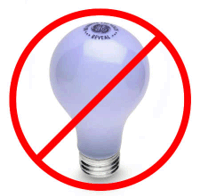|
|
Lights out for incandescent
lightbulbs
11.07.12
HOUSEHOLDS are set to
stockpile traditional incandescent light bulbs as
production officially comes to an end in the coming
weeks.
Irish light bulb maker, Solus, will end production
of their incandescent bulbs next month in line with
an EU directive passed in 2009 to phase in greener,
energy-saving alternatives.
The regulations have been introduced over six stages
in the last three years with the brighter bulbs of
100 watts and over, frosted and the least energy
efficient bulbs the first to go.
All remaining lower wattage clear glass bulbs have
been banned progressively between September 2009 and
September 2012. |
The most commonly used
bulb, the 60 watt, could be produced until last
September while the 40 watt and 25 watt bulbs can
still be made until September 2012.
Solus managing director, Mark Corrigan, said the
company would stop manufacturing all incandescent
bulbs next month with the production line adapted to
halogen. However, he said shops would still be
allowed to sell off their stockpiles of the
traditional bulbs. |
 |
|
Ban on incandescent light bulbs. |
"The ban is on
production, there is no effect on retailers," said
Mr Corrigan, whose company employs more than 80
people and makes eight million bulbs a year.
"We will stop making incandescent bulbs at the end
of August. We have introduced the Halogen Energy
Saver which looks similar but is Class C and saves
30 per cent electricity and complies with the EU
directive," he added.
Meanwhile, the Gillen family who have run a
traditional grocery and hardware store in Moville,
Co Donegal, for several generations, are expecting
sales to soar as people start stockpiling the old
bulbs.
"There was a big panic a few years ago and people
started stockpiling when word of the ban first came
out,” said Leo Gillen.
“It calmed down again and now it's been so long
since the announcement, people probably think the
old lights are never going off.
"We still have a fair lot of stock left in all the
wattages. We stocked up on the big wattage bulbs
particularly because elderly people were looking for
them. They say they find it hard to see with the new
bulbs and don't like the way they take a while to
brighten up."
Lighting represents up to a fifth of a household’s
electricity consumption while research shows that
replacing three 100 watt incandescent light bulbs
with compact fluorescent lamps (CFLs) for three
hours per day, can save the average household up to
€43 per annum. |
|

